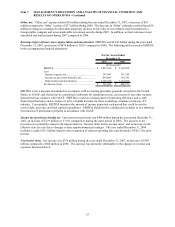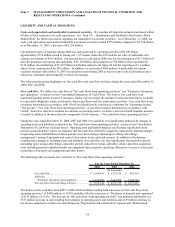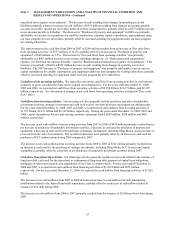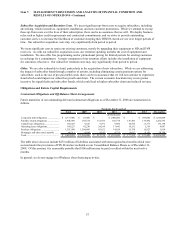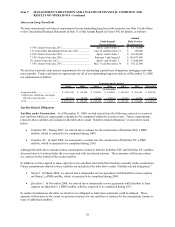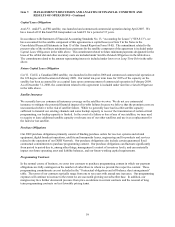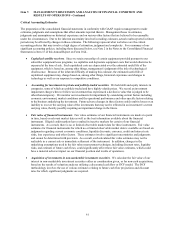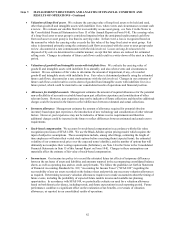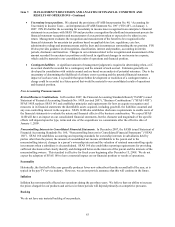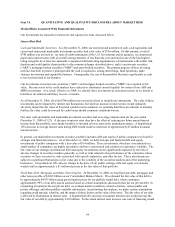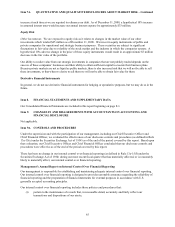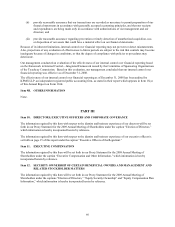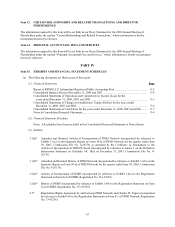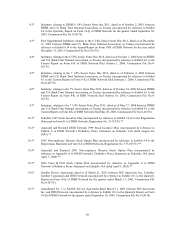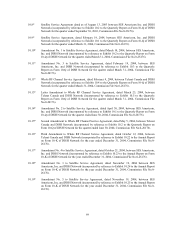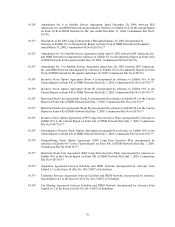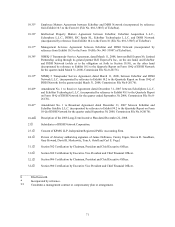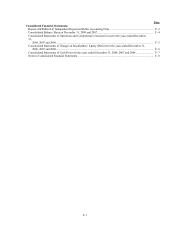Dish Network 2008 Annual Report Download - page 73
Download and view the complete annual report
Please find page 73 of the 2008 Dish Network annual report below. You can navigate through the pages in the report by either clicking on the pages listed below, or by using the keyword search tool below to find specific information within the annual report.Item 7. MANAGEMENT’S DISCUSSION AND ANALYSIS OF FINANCIAL CONDITION AND
RESULTS OF OPERATIONS - Continued
63
x Uncertainty in tax positions. We adopted the provisions of FASB Interpretation No. 48, “Accounting for
Uncertainty in Income Taxes – an Interpretation of FASB Statement No. 109” (“FIN 48”), on January 1,
2007. FIN 48 clarifies the accounting for uncertainty in income taxes recognized in an enterprise’s financial
statements in accordance with SFAS 109 and prescribes a recognition threshold and measurement process for
financial statement recognition and measurement of a tax position taken or expected to be taken in a tax
return. Management evaluates the recognition and measurement of the benefit to be recognized in the
financial statements for uncertain tax positions based on applicable tax law, regulations, case law,
administrative rulings and pronouncements and the facts and circumstances surrounding the tax position. FIN
48 also provides guidance on derecognition, classification, interest and penalties, accounting in interim
periods, disclosure and transition. Changes in our estimates related to the recognition and measurement of the
amount recorded for uncertain tax positions could result in significant changes in our income tax expense,
which could be material to our consolidated results of operations and financial position.
x Contingent liabilities. A significant amount of management judgment is required in determining when, or if,
an accrual should be recorded for a contingency and the amount of such accrual. Estimates generally are
developed in consultation with outside counsel and are based on an analysis of potential outcomes. Due to the
uncertainty of determining the likelihood of a future event occurring and the potential financial statement
impact of such an event, it is possible that upon further development or resolution of a contingent matter, a
charge could be recorded in a future period that would be material to our consolidated results of operations
and financial position.
New Accounting Pronouncements
Revised Business Combinations. In December 2007, the Financial Accounting Standards Board (“FASB”) issued
Statement of Financial Accounting Standards No. 141R (revised 2007), “Business Combinations” (“SFAS 141R”).
SFAS 141R replaces SFAS 141 and establishes principles and requirements for how an acquirer recognizes and
measures in its financial statements the identifiable assets acquired, including goodwill, the liabilities assumed and
any non-controlling interest in the acquiree. SFAS 141R also establishes disclosure requirements to enable users of
the financial statements to evaluate the nature and financial effects of the business combination. We expect SFAS
141R will have an impact on our consolidated financial statements, but the character and magnitude of the specific
effects will depend upon the type, terms and size of the acquisitions we consummate after the effective date of
January 1, 2009.
Noncontrolling Interests in Consolidated Financial Statements. In December 2007, the FASB issued Statement of
Financial Accounting Standards No. 160, “Noncontrolling Interests in Consolidated Financial Statements” (“SFAS
160”). SFAS 160 establishes accounting and reporting standards for ownership interests in subsidiaries held by
parties other than the parent, the amount of consolidated net income attributable to the parent and to the
noncontrolling interest, changes in a parent’s ownership interest and the valuation of retained noncontrolling equity
investments when a subsidiary is deconsolidated. SFAS 160 also establishes reporting requirements for providing
sufficient disclosures that clearly identify and distinguish between the interests of the parent and the interests of the
noncontrolling owners. This standard is effective for fiscal years beginning after December 15, 2008. We do not
expect the adoption of SFAS 160 to have a material impact on our financial position or results of operations.
Seasonality
Historically, the first half of the year generally produces fewer new subscribers than the second half of the year, as is
typical in the pay-TV service industry. However, we can not provide assurance that this will continue in the future.
Inflation
Inflation has not materially affected our operations during the past three years. We believe that our ability to increase
the prices charged for our products and services in future periods will depend primarily on competitive pressures.
Backlog
We do not have any material backlog of our products.


